Russia Launches Large Missile And Drone Attack On Ukraine
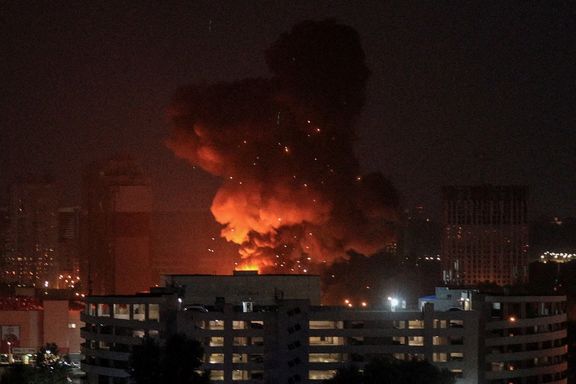
Russia launched its biggest missile and drone attack since the spring in the early hours of Wednesday against Ukraine’s capital Kyiv, killing two and destroying property.

Russia launched its biggest missile and drone attack since the spring in the early hours of Wednesday against Ukraine’s capital Kyiv, killing two and destroying property.
Ukrainian air defenses shot down all 28 incoming missiles and 15 of the 16 drones in the overnight attack, which also targeted the Black Sea region of Odesa, said General Valeriy Zaluzhnyi, Commander-in-Chief of Ukraine's armed forces.
Russia uses long-range Iranian Shahed kamikaze drones to attack Ukrainian infrastructure and civilian targets. The drones are also used in concert with missiles to confuse and exhaust Ukraine’s air defenses.
The United States and its European allies have imposed sanctions on individuals and entities involved in Iran’s drone production and transfer of hundreds of the weapons to Russia. They have also repeatedly warned Tehran not to expand its military cooperation with Moscow.
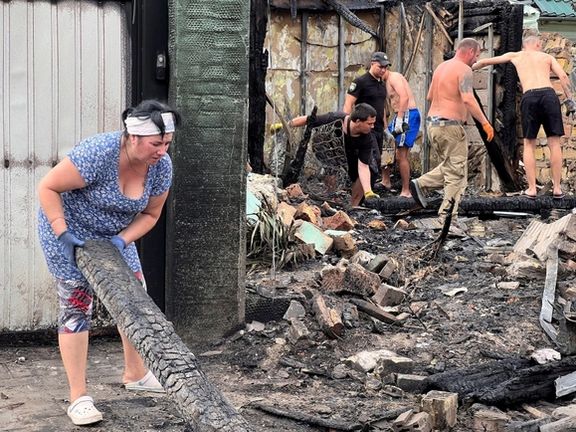
Russia has conducted regular, but smaller, air strikes on Kyiv this summer, and hit the capital with large-scale aerial attacks in May.
The latest attack began with drones heading towards Kyiv from different directions and was followed by a salvo of missiles launched by Tu-95 strategic bombers.
It was not immediately clear what had been hit by the single drone that was not shot down.
"Kyiv has not experienced such a powerful attack since spring. The enemy launched a massive, combined attack using drones and missiles," Serhiy Popko, the head of the city's military administration said on Telegram.
The bodies of two people were found in a non-residential building, mayor Vitali Klitschko said on Telegram.
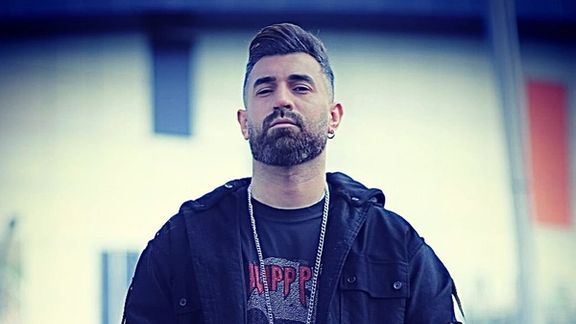
The Ministry of Intelligence of Iran claims it has dismantled a "widespread network" of terrorists operating across multiple provinces in the country.
In a detailed statement, the ministry disclosed that they have identified and arrested 14 individuals suspected of being linked to an "expansive terrorist-Zionist network." in the provinces of Khuzestan, Mazandaran, Kermanshah, and Sistan and Baluchestan. In the same operation, officials have reported the discovery and seizure of 43 potentially explosive devices.
The ministry's statement alleged that the dismantled network had ties to individuals located in the Netherlands and Denmark. They also named the suspects as Shahin Zahmatkesh, known as Shahin Lou, a member of the TM Bax music group in in Denmark, and Siamak Tadayyon Tahmasbi, an artist based in the Netherlands.
The ministry also pointed to the role of social media networks and foreign television outlets, suggesting that these platforms aided disseminating of information related to the network's activities.
Furthermore, the statement suggested that members of the disrupted network harbored intentions to assasinate notable personality. This aligns with previous claims made by Iranian authorities regarding external threats to the nation's stability.
There have been numerous instances of sabotage and infiltration in Iran in recent years, with serious clandestine attacks on nuclear, military and important economic targets. Iranian intelligence was badly discredited when two large sabotage attacks took place in 2020 and 2021 against its most important nuclear facility in Natanz. A few key military and intelligence officials have also been assassinated. The incidents are largely attributed to Israel, although Israeli officials have never officially taken responsibility.
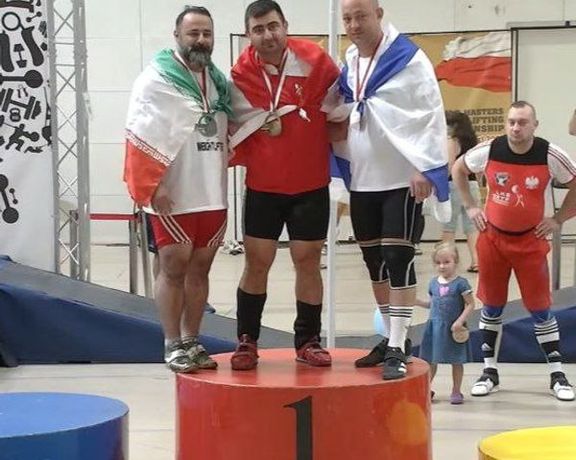
Mostafa Rajai Langroudi, a weightlifter has been banned from the sport after posing for a photograph with an Israeli at the World Master Weightlifting Championships in Poland.
Sajjad Anoushiravani, the head of the Weightlifting Federation announced on Tuesday that Rajai has been banned from the sport for life after the podium photo was published. Simultaneously, Anoushiravani made the decision to dissolve the veterans' committee of the federation.
Anoushiravani said, "Upon becoming aware of this inexcusable incident, stringent actions were taken against those involved. The athlete responsible has received a lifetime ban, and upon conducting thorough investigations, resolute measures will be taken against all individuals implicated. Furthermore, effective immediately, all operations of the veteran athletes' committee will be terminated."
The Islamic Republic's anti-Israel policy has driven a significant number of Iranian athletes to refrain from competing against Israeli counterparts, often citing various pretexts. This stance has consequently led to the defection of numerous Iranian athletes seeking asylum in other countries.
While no official legislation prohibits Iranian athletes from playing against Israelis, pressure from federation officials often coerces athletes into intentionally losing matches, forfeiting games, or claiming injuries to evade encounters with Israeli competitors. Supreme Leader Ali Khamenei has consistently applauded Iranian athletes who opt out of competing against Israelis. In September 2021, he explicitly encouraged them to continue this stance even in the face of potential sanctions from international sports bodies.
Over the past few years, approximately 30 Iranian athletes have defected from national teams and sought asylum in foreign nations. Notable examples include Judo champion Saeid Mollaei and Greco-Roman wrestler Ali Arsalan.
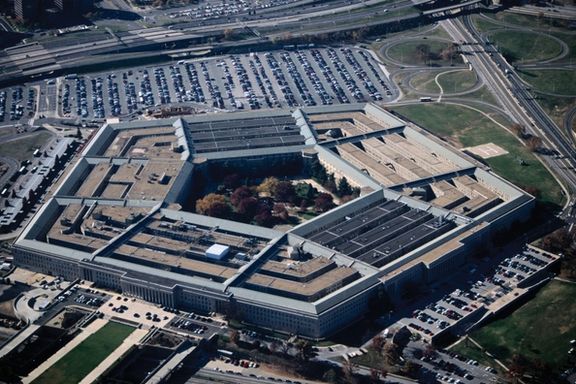
The US Defense Department has said that there is still a significant and ongoing threat to commercial ships in the Persian Gulf and the Strait of Hormuz off the coast of Iran.
In a statement on Tuesday, Sabrina Singh, Deputy Pentagon Spokesperson emphasized Iran's ongoing threat to commercial ships and commented on the substantial contingent of US forces stationed in the Middle East. "As long as there remains a need for these forces to be in the region, they're going to stay there,” she said.
She also referred to the IRGC presence in the waters of the region as harassment. “Over the past few weeks, we've seen harassment from IRGC-backed groups over commercial ships." Singh said, "We have not seen that threat drop, I would say, so we haven't seen a reason to move our forces out."
In July, the US Defense Secretary announced a strategic response to Iran's attempts to seize ships in the Persian Gulf and the Strait of Hormuz, which involves deploying naval and ground forces, including F-35 and F-16 fighter jets and missile-equipped destroyers.
Citing data, US authorities said that over the past two years, Iran has engaged in a series of disruptive activities targeting nearly 20 internationally-registered commercial ships.
Since 2019, Iran has consistently targeted commercial ships and oil tankers in the Persian Gulf, including seizing two more oil tankers and attempting to commandeer two other vessels.
The strategic significance of the Strait of Hormuz in global oil transit is undeniable, with approximately 20% of the world's crude oil traversing this critical chokepoint en route to international markets.

The UN nuclear watchdog says Iran should give assurances to the world that it is not making nuclear weapons as it already has enough material to make several bombs.
Rafael Mariano Grossi, the director general of the International Atomic Energy Agency (IAEA), made the remarks during an event to address the nuclear challenges in Iran, Ukraine and North Korea, hosted by the Swedish Institute of International Affairs on Monday.
The IAEA chief stated that if Iran wants to continue enriching uranium at 60-percent level and higher, “they should know that [they] must give credible assurances to the international community about what they are doing to a stock of highly enriched uranium, for which the needs of a peaceful nuclear program are... not so clear.”
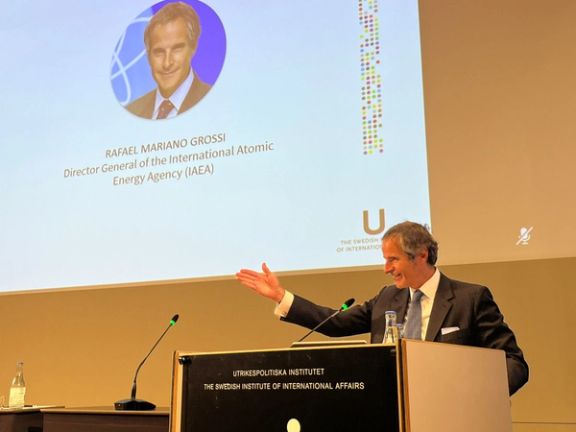
He also expressed concerns about Iran not coming clean about several issues regarding traces of uranium at several older sites. Without explicitly mentioning Israel, he said concerns about Iran’s nuclear program has prompted certain regional countries to hint at “taking some action about what is going on in Iran.”
Israel has repeatedly warned of action against its archnemesis Iran, highlighting that it will not be deterred by the Biden administration's efforts to restart any nuclear deal with Iran. "Israel will do what it needs to do to defend itself by itself against the threat of Iran to annihilate it with nuclear weapons,” Israeli Prime Minister Benjamin Netanyahu said earlier in August. He was referring to a recent unwritten prisoner exchange agreement between Washington and Tehran that many – such as Qatar – hope to expand to a multifaceted accord that contains the regime’s nuclear program and restrains its proxy militias in Iraq and Syria. There are also speculations by Iran-based media about a comprehensive deal in the making with the United States.
Grossi stressed the necessity of “a system, a program, be it JCPOA (Joint Comprehensive Plan of Action) or any other agreement or understanding that would allow the IAEA to have the visibility on Iran’s nuclear program, which is commensurate with the capability that Iran has.”
“Iran has accumulated enough nuclear material for several nuclear weapons,” Grossi said, emphasizing that “I must say Iran does not have nuclear weapons... It is important that we make the distinction between having the capabilities and having nuclear weapons.”
He underscored that it is also important not to lose sight of the fact that “we need to come to a point where Iran’s nuclear program is stabilized and where we have the diplomatic conditions and systems to provide credibility there.”
He added that it is a regrettable situation that the Russian invasion of Ukraine and its consequent worries have pushed concerns about Iran’s nuclear program out of the media and politicians’ attention. “We have not been able to come to a point where we can say that everything is ok.”
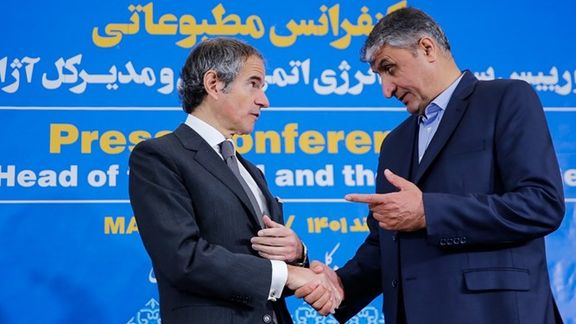
Grossi highlighted that following the US withdrawal from JCPOA under then-president Donald Trump in 2018, Iran gradually abandoned the restraints imposed by the agreement. “At the moment, although this agreement has not been declared as obsolete or dead... it is an empty shell,” he said, noting that “nobody is observing any commitment, provision, or obligation in this agreement.”
He pointed out that Iran is currently enriching uranium at 60 percent, underlining that back in January the IAEA sampled from a cascade of centrifuges at an enrichment plant in Iran and reached to the conclusion that Tehran is enriching at 84 percent. “Weapon level is 90 percent,” he explained.
In February, Iran’s Nuclear Agency Spokesman Behrouz Kamalvandi implicitly accepted the accusation, claiming that finding the highly-enriched uranium particles in the pipes connecting centrifuges was a “normal issue.” “It’s a natural thing in enrichment... The machine is spinning fast. If the amount of the feed decreases for a moment, the enrichment will increase by a few percent,” he said.
Despite recent reports saying that Iran has slowed the buildup of uranium needed for weapons, the regime’s nuclear chief said this week that enrichment is going on in accordance with a domestic law.
Mohammad Eslami, the head of the Atomic Energy Organization of Iran, was referring to the bill passed by the parliament in December 2020, dubbed the “Strategic Action Plan to Lift Sanctions and Protect Iranian Nation's Interest.” The bill obligated the government to step up Iran’s nuclear program and enrich uranium beyond the limits set by the 2015 nuclear agreement until US sanctions would be lifted.
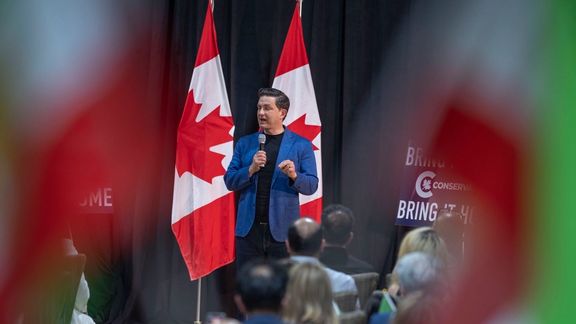
The leader of Canada’s Conservative Party, running to be the next prime minister, has vowed to “kick out” Iran’s Revolutionary Guards if he wins office.
Pierre Poilievre is also the leader of the country’s Official Opposition -- the party possessing the most seats in the House of Commons that is not the governing party. The Conservative Party of Canada, or the Tories, is leading in opinion polls and projections for the upcoming federal election, slated to take place on or before October 20, 2025, to elect members of the House of Commons to the 45th Canadian Parliament.
After a campaign event among Iranian Canadians on Sunday, Poilievre said on his X account, “Inspiring a group of freedom-loving Canadians who want to ban IRGC terrorists and kick regime thugs out of Canada. That is what I will do.”
Echoing the same sentiments, Anna Roberts -- another Conservative Party parliamentarian – said after another campaign event for Poilievre that “IRGC terrorists should not be free to roam our streets and should be kicked out of Canada.” “A common sense Conservative government will bring home safety in our streets,” she added on her X account.
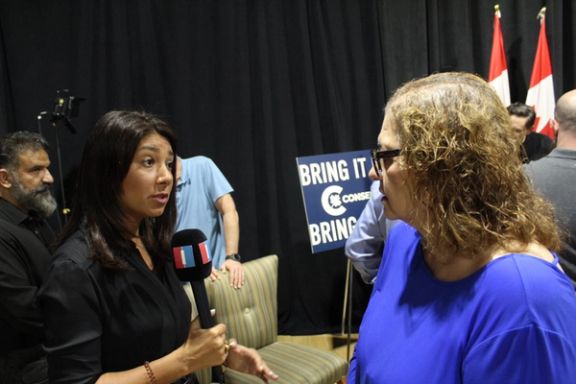
The promise has resonated with a large group of Iranians who have been critical of Canada's Liberal Prime Minister Justin Trudeau over his failure to designate the IRGC as a terrorist organization. There are 73 groups on Canada's terrorist list, but the Revolutionary Guard is not one of them. Ottawa has intensified measures against the regime in recent years, especially following the downing of a civilian airliner by IRGC in 2020 killing dozens of Canadians and the nationwide protests following the death of 22-year-old Mahsa Amini in the custody of police.
Pundit Babak Taghvaee said earlier in the week, “Canada is a Paradise for IRGC terrorists, authorities of Iran's Islamic Regime and their supporters.”
On Saturday, a video went viral in which a supporter of the Iranian regime chanted slogans in support of the Islamic Republic and its leaders Ali Khamenei through a megaphone as he passed through a neighborhood with a lot of Iranian shops and businesses.
So far, Canada has sanctioned 170 Iranian individuals and 192 Iranian entities, including key IRGC and members of the regime’s security, intelligence and economic apparatuses. In 2012, Canada designated Iran as a state supporter of terrorism under the State Immunity Act.
In June, Canada's Senate passed a non-binding motion to designate the the Guards as a terror organization. Ratna Omidvar, an independent senator for Ontario who fled Iran in 1981 and has been campaigning fiercely against the IRGC, said at the time that “the crimes of the Islamic regime and the IRGC go beyond the borders of Iran", citing the contribution of the IRGC to Russia's brutal invasion of Ukraine, for which Iran has supplied kamikaze drones. In June 2018, the Canadian parliament passed another similar motion, introduced by MP Garnet Genuis, to designate the IRGC but the government did not follow up on the action.
The federal government has referred to the IRGC as a terrorist organization, described its leadership as terrorists, announced measures to make its senior members inadmissible to Canada, and has listed the outfit’s extraterritorial expeditionary division Quds Force as a terrorist entity. However, despite numerous calls from the federal Conservative party, activists and even US lawmakers as well as the families of victims of the Ukrainian flight that was shot down by the IRGC, the government has refused to designate the whole entity as a terrorist entity under the country’s Criminal Code.
The airliner was shot down by two air-defense missiles fired by the IRGC as it took off from Tehran’s Imam Khomeini International Airport. All 176 passengers and crew, including 63 Canadians and 10 from Sweden, as well as 82 Iranian citizens on the plane died in the disaster.
Canadian officials said last year that the designation of the group would be too much of a “blunt instrument” that could punish innocent people in Canada who were conscripted into the IRGC as part of their mandatory military service.
Following years of campaigning by human rights activists and Iranians dissidents, Canada finally announced sanctions last November against the IRGC, permanently banning over 10,000 of its officers and other senior officials from entering Canada. However, the ban on regime officials “applies to those who were senior officials at any time from November 15, 2019, onwards,” practically giving the greenlight to a large number of regime officials to reside in Canada.






